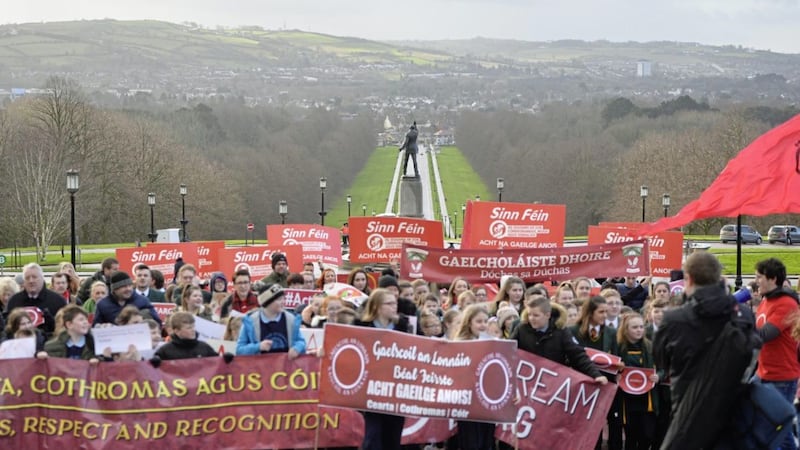Orange Order members were instrumental in orchestrating the grassroots unionist backlash that spooked the DUP into pulling out of the Stormont deal, it has emerged.
This feels like appropriate symmetry.
Coming admittedly from the perspective of someone who spent the 1990s in the middle of Portadown, I cannot help seeing an Irish language act as the sash my Gaeilgeoir wore.
Like Drumcree, the Irish language dispute owes its intractability to a belief that crying ‘culture’ and ‘rights’ marks the self-evident end of an argument, to which any further objection can only be through prejudice - although the standing of culture and rights in both cases is highly debatable in principle, practice and law.
Again in both cases, a small number of people have elevated their cause to a matter of overwrought pride for an entire political community.
There might seem to be no comparison between promoting Irish and parading through streets where you are not wanted - yet some language activists are forcing this comparison, by demanding bilingual streets sign everywhere, even citing the Shankill Road.
What sort of person objects to a small token of an anglicised Irish place-name, a Gaeilgeoir might ask.
What sort of person objects to one 10-minute parade a year, any Orangeman would reply.
Efforts have been made to sell Irish to unionists on the grounds that it belongs to them too, in contrast to supremacist and exclusionary Orangeism.
No doubt many advancing this argument are sincere but it can still come across as arrogance.
Any Catholic can become an Orangeman by simply converting to Protestantism - hardly an onerous requirement for joining a Protestant religious fraternity.
Likewise, unionists are told they can love Irish by simply accepting their Irishness, as if that is not a challenge that could present them with any reasonable difficulty.
Whether or not any of this equivalence is valid, it is a fact that the Orange Order has pitted itself against an Irish language act, creating a major deadlock via an unprepared DUP leadership.
That raises the question of why the DUP did not balance Orange and Irish issues in the Stormont deal.
Instead, it tried to balance Irish with Ulster-Scots - a subject even the dourest Orangeman struggles to take seriously.
Parading is addressed in last month’s draft Stormont agreement but only as a self-contained and almost done deal. The Fresh Start agreement set up a Commission on Flags, Identity, Culture and Tradition (FICT), which began work in 2016 and completed its report for executive discussion at the start of this year, although civil servants are refusing to publish it in the absence of Stormont ministers.
The report is likely to find Orange favour - the commission was so stacked with unionists the SDLP accused Sinn Féin of being asleep at the wheel when setting it up. Its remit takes as given that parading will be devolved, the Parades Commission will be replaced and a code of conduct on parades will be put into law - an idea the Orange Order has advocated then backed away from over the past decade, most notably when it crashed the 2013 Haass talks over the issue, but which it will presumably accept now FICT has consulted it further on content and regulation.
All this could have been set against an Irish language act by making it a prominent part of the overall three-part ‘cultures act’ approach to language legislation, along with recognition and respect for Orangeism more broadly.
Instead, the only mention of parading or allusion to Orange interests in the draft deal is a single sentence - not in square brackets - at the very end of the cultures act section, stating: “The Executive will bring forward the discussion paper on parades agreed in the Fresh Start agreement.”
This coyness perhaps stems from the wider sense that parading is ‘fixed’, with few remaining contentious marches and a commission report ready to go. The DUP also had to consider the confidentiality of its negotiations with Sinn Féin. If it had flaunted or leaked the FICT paper then run around boasting about how it had offset Irish language legislation, that would have compromised the talks and caused considerable difficulties for republicans.
With hindsight, however, that looks like it would have been the lesser of two evils. There must now be a strong case for publishing the report before attempting to restart talks.
Not only did the DUP forget to sell the deal. It did not realise which part deserved the hard sell.
newton@irishnnews.com









